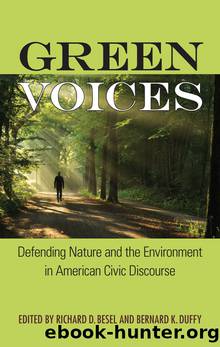Green Voices: Defending Nature and the Environment in American Civic Discourse by Richard D. Besel; Bernard K. Duffy

Author:Richard D. Besel; Bernard K. Duffy
Language: eng
Format: epub
ISBN: 9781438458519
Publisher: State University of New York Press
Published: 2016-09-15T00:00:00+00:00
CONCLUSION
Despite accusations characterizing Carson as âa priestess of natureâ and âdevotee of a mystical cult,â89 Carson remained steadfast in her search for the scientific truth about the impact of pesticides. She struck a nerve, and a hysterical one at that, among high-ranking government and industry personnel, including former U.S. secretary of agriculture Ezra Taft Benson, who in correspondence to President Dwight D. Eisenhower questioned: âWhy [is] a spinster with no children was so concerned about genetics? ⦠[She was] probably a communist.â90 The WNPC and GCA speeches, the two most pivotal and public speeches during her short life, demonstrate Carson elicited what Killingsworth and Palmer labeled anti-environmentalist hysteria from her critics.91 In the WNPC speech Carson stated a number of American scientists feared that âa spirit of lysenkoismâ was taking hold of American agriculture. Her reference to the Soviet horticulturist Trofim Lysenko, a promoter of pseudoscience in place of genetics, turned the tables on those who accused her of communist leanings.92
Of Carsonâs work, Professor Lisa Sideris wrote: âHuman silence was complicit in the more profound silencing of nature that Carson dreaded. Only by breaking the silenceâthe reticence of government agencies and chemical companiesâcould humans avert the silencing of nature.â93 Carson saw her public speeches and the bookâs controversy as a means to avert the silence about pesticide use and include the public in dialogue. Environmental scientist Jane Lubchenco pointed out Carsonâs understanding of dynamic objectivity, that subject and object cannot be separated as science informs how people understand the world, and âpersonal and political decisions will of course be based on a wide variety of factors, including values, economics, social pressures, politics and more, but those decisions will be better if they are informed by the most current and credible scientific knowledge.â94 Lubchencoâs words reflect Ulmanâs characterization of nature writing as an ethical interpretation, one that asks Carsonâs listeners to consider the ethos and pathos of the war on nature and come to judgment about the importance of grassroots action to invoke the ideal place of the political jeremiad, where public action is necessary for repentance and reform.
Carson raised moral arguments in her speeches including the âovervaluation or exclusive focus on economic goals and pursuitsâ and the human âwar on nature.â95 Critics of Silent Spring argued the decision to use pesticides was between public health and prices. These arguments were assailed in the media, and Carson spent time in both the WNPC and GCA speeches refuting these criticisms. For example, one article in U.S. News & World Report stated: âTodayâs American housewives have the widest choice of fruits and vegetables, and meats and dairyâat prices to fit their budgets.â96 The use of the word âhousewivesâ once again showcased Carson, by contrast, as an unmarried woman. Carson spent little time refuting the claims against her gender in either speech, though clearly her critics were âmostly men, mostly white, and mostly affiliated with some bureaucratic institution.â97 Carson wanted the focus of the Silent Spring debate to be about science, not gender. She chose to refute the criticism and statements that were faulty.
Download
This site does not store any files on its server. We only index and link to content provided by other sites. Please contact the content providers to delete copyright contents if any and email us, we'll remove relevant links or contents immediately.
Cecilia; Or, Memoirs of an Heiress — Volume 1 by Fanny Burney(32547)
Cecilia; Or, Memoirs of an Heiress — Volume 2 by Fanny Burney(31945)
Cecilia; Or, Memoirs of an Heiress — Volume 3 by Fanny Burney(31931)
The Lost Art of Listening by Michael P. Nichols(7494)
Asking the Right Questions: A Guide to Critical Thinking by M. Neil Browne & Stuart M. Keeley(5759)
We Need to Talk by Celeste Headlee(5608)
On Writing A Memoir of the Craft by Stephen King(4935)
Dialogue by Robert McKee(4389)
Pre-Suasion: A Revolutionary Way to Influence and Persuade by Robert Cialdini(4224)
I Have Something to Say: Mastering the Art of Public Speaking in an Age of Disconnection by John Bowe(3872)
Elements of Style 2017 by Richard De A'Morelli(3341)
The Book of Human Emotions by Tiffany Watt Smith(3303)
Fluent Forever: How to Learn Any Language Fast and Never Forget It by Gabriel Wyner(3079)
Name Book, The: Over 10,000 Names--Their Meanings, Origins, and Spiritual Significance by Astoria Dorothy(2979)
Why I Write by George Orwell(2945)
Good Humor, Bad Taste: A Sociology of the Joke by Kuipers Giselinde(2944)
The Art Of Deception by Kevin Mitnick(2796)
The Grammaring Guide to English Grammar with Exercises by Péter Simon(2740)
Ancient Worlds by Michael Scott(2682)
